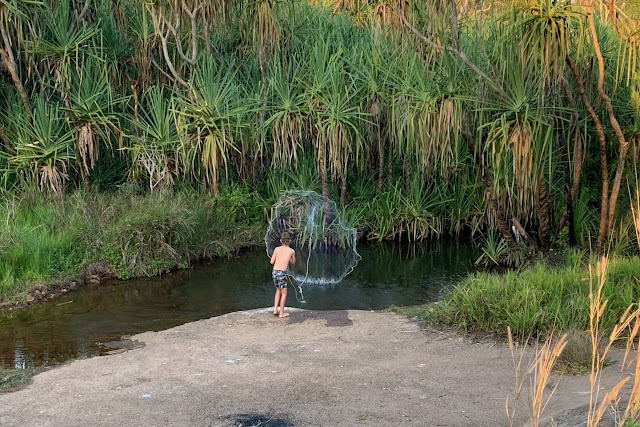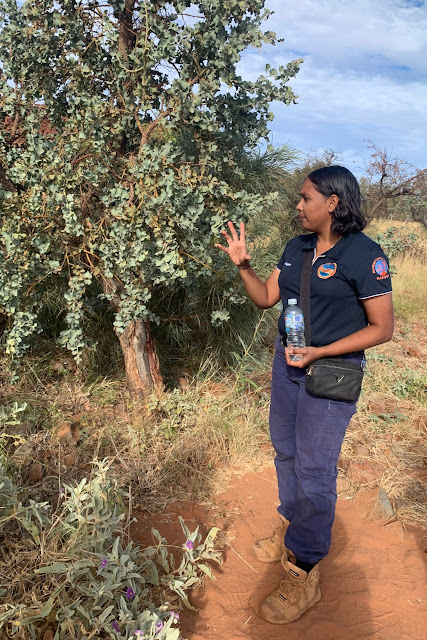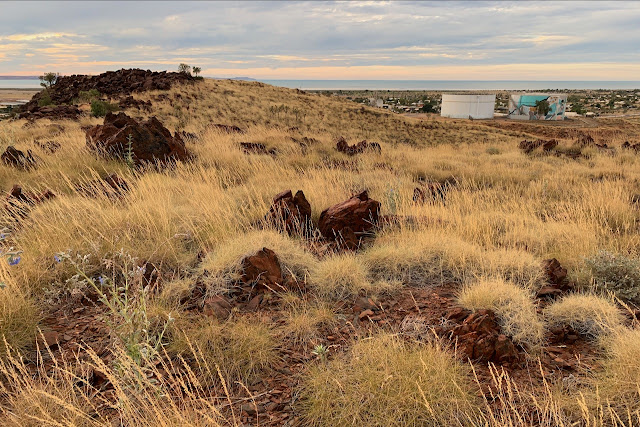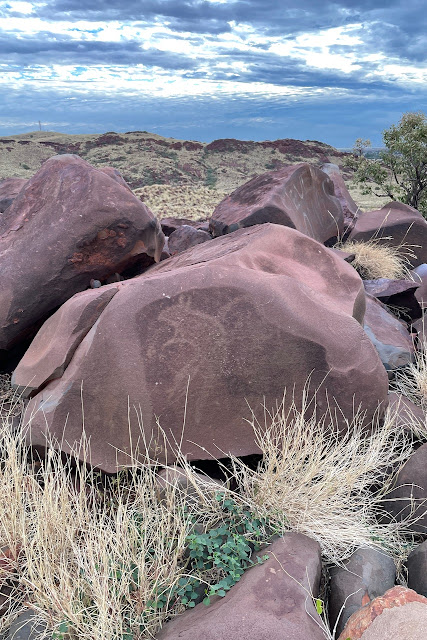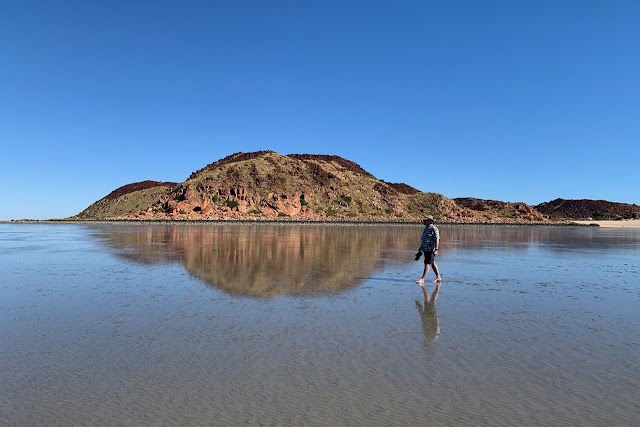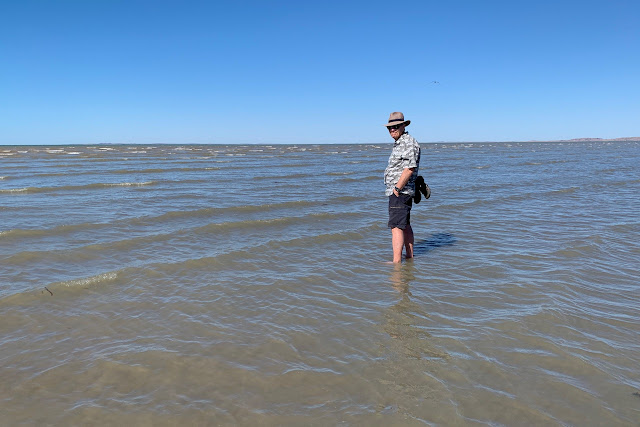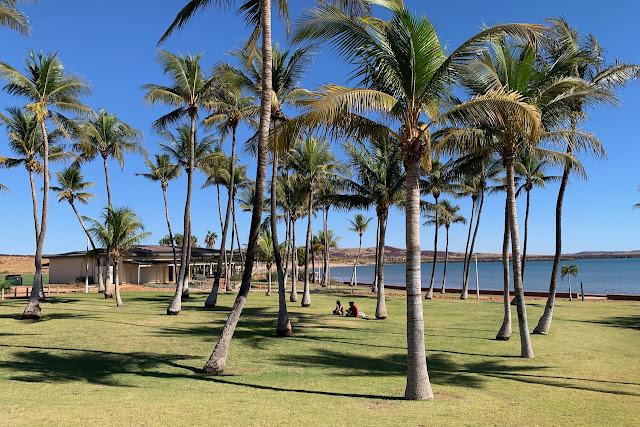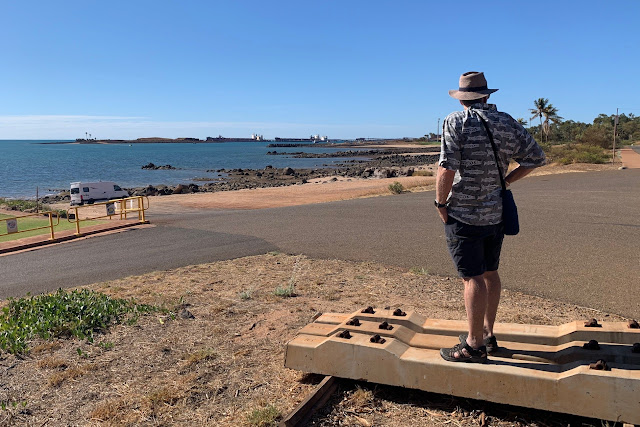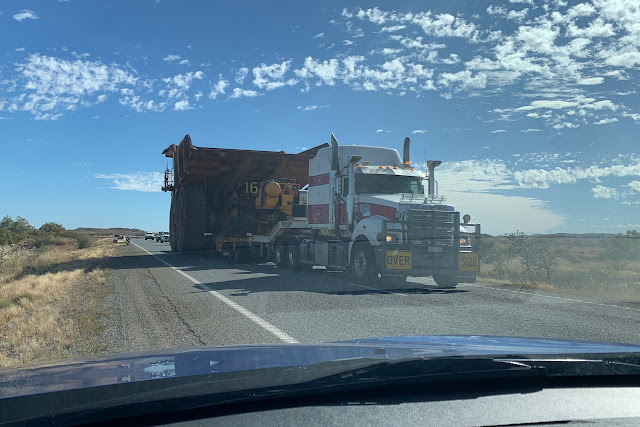We drove 40 klm east from Karratha this morning to the small town of Roebourne, the oldest town settlement between Geraldton and Darwin. It prospered during its gold boom in the late nineteenth century. We've only known of Roebourne because of its dark and tragic Aboriginal history but there is still quite a bit of evidence of its former civic prosperity in the town to this day.
The local Ngarluma people and other traditional owner groups in the area were subjected to dispossession and incredible cruelty by the settlers and law enforcers since the earliest days.
There was an eventual flash point in 1983 when an Aboriginal teenager, John Pat, died in police custody after being struck and beaten by a group of drunk off duty policeman outside the local hotel. The four policemen involved were never held to account for their actions. The shocking event helped bring on calls for the Royal Commission into Aboriginal Deaths in Custody which was established in 1987. The profound impact of John Pat's murder and the tragedy and trauma of European settlement on Roebourne was conveyed in the amazing Big hART production "Hipbone Sticking Out" which we saw in Canberra in 2014.
While there is still evidence of intergenerational trauma in Roebourne today it is also enjoying a period of arts/education led renewal and we were keen to see the evidence of that.
This is a pic of me outside the old Roebourne PO, built in 1887 by the Bunning brothers, founders of what is know known as Bunnings Hardware stores (Aboriginal people were forced to do the stonework on these buildings under slavery conditions).
Inside the heritage listed Dalgety House (1889) we found the wonderful Yinjaa-Barni Art Centre, a place where local artists can come and work in a supportive environment, with materials supplied and sales and marketing arranged with integrity.
It was wonderful to meet the group of local artists and listen to their stories about their painting and how much they enjoy working at the art centre each day. Marlene Howard (in the pic below) told me she only started painting in 2006 and one of her paintings has been presented to the Queen! The works from this centre are represented in galleries all over Australia. I made a note to check out the works from the Art Centre at Chalk Horse Gallery in Darlinghurst next time I am in Sydney.
I admired the calm way these grandmothers kept on working while dealing with the inevitable interruptions of small grandchildren in their care while they were painting.
Just up the road was the Ngarluma Yindjibarndi Foundation Ltd. (Aboriginal-owned) social enterprise cafe and gallery & supermarket - Leramugadu, a not for profit enterprise that has given the local community food security, a place to gather and feel welcome, internet access and a gallery space for local art. Leramugadu also has a beautifully laid out supermarket that welcomes locals and visitors alike - it had such a welcoming, inclusive (and clean and spruce) vibe.
In addition Big hART has maintained its presence in Roebourne with a well supported music performance program, digital art programs, and connection to country and storytelling programs. It all seemed so positive and we got a good sense of real progress being made in Roebourne.
We headed back towards Karratha afterwards, then on to the Dampier Highway towards the Burrup Peninsula (Murujuga - Hipbone Sticking Out). We were heading to the Murujuga NP but as we crossed over to Burrup we couldn't help but be reminded of the significance of Dampier's deep water port in this mining region.
At this point in the pic below we were passing huge salt pans and watching an empty Hamersley Iron train hurtling back to ??? for another load of iron ore. We reckoned the train was about a kilometre long!
We eventually made our way to Ngajarli (Deep Gorge), the area of the Murujuga NP that allows limited access by the public to a small outcrop of the over 2 million (rock art) petroglyphs that are scattered over Burrup. Murujuga is home to the largest and most diverse collections of rock art in the world - some of which could be up to 47,000 years old. Local Aboriginal groups have maintained their deep spiritual connection to the art work to the current day. Its a site that is well on the way to achieving World Heritage Listing despite the challenges that poses to the mining interests seeking to dominate this part of the world.
The 700 metres of access we're allowed (via a boardwalk) at Ngagarli is beautifully laid out and labelled.
The gorge had a strong spiritual presence for us ....... in this part of the park the petroglyphs weren't always easy to find, but the act of scanning and deep observation helped us connect even more strongly with what we were seeing - images depicting animals, marine life, plants, hunting, weapons, people, footprints, tribal markings........ just imagine over 40,000 years of continuous culture and spirituality??
We're looking forward to our second visit to Deep Gorge with an Aboriginal guide tomorrow morning!
We'd planned to have a swim afterwards at nearby Hearson's Cove - but we'd hit low tide and it was going to be a very l-o-n-g walk to get to a swimmable depth here.
It felt like we'd walked for miles and still only got ankle deep.
But we agreed this is an absolutely stunningly amazing part of the world!!!!!
This pic (below) is a reminder that even this stunningly beautiful part of Burrup, so close to the amazing and spiritual rock art of Deep Gorge has to coexist with the industrialisation of Dampier port which includes a huge natural gas processing plant quite close to Hearson's Cove.
We had a quick look at Dampier town too - which didn't take long ......
We'll make sure we find the famous Dampier Red Dog (The Pilbara Wanderer) Memorial Statue when we return tomorrow.









